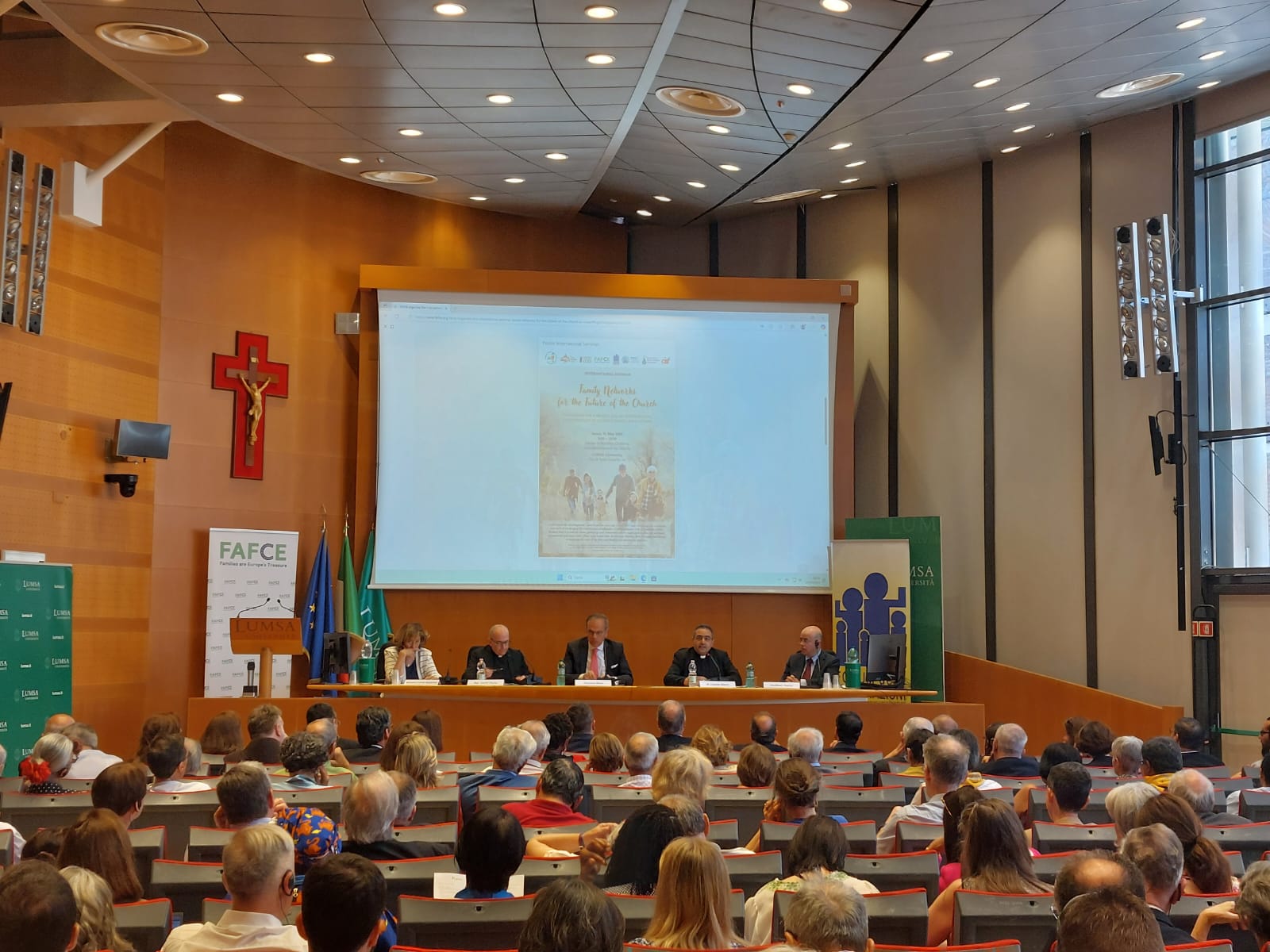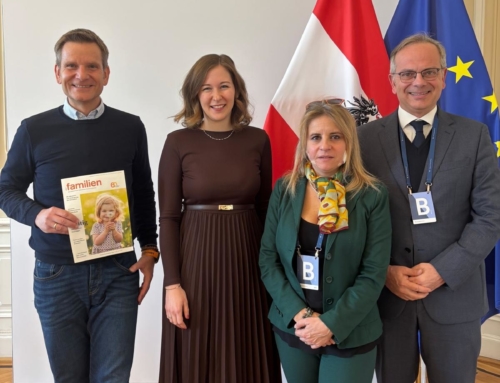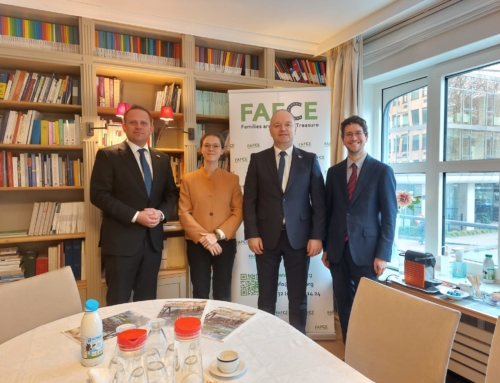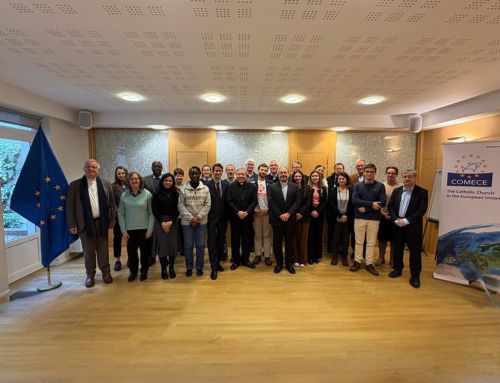Rome, 2nd of June 2025
The Federation of Catholic Family Association in Europe (FAFCE) had the honour to coorganise with the Italian Forum of Family Associations last Friday on Saturday 31 May the International Seminar on “Family Networks for the Future of the Church – Challenges for a Project for an International Confederation of Catholic Family Associations”, which took place at LUMSA University in Rome, in the framework of the Jubilee of Families, Grandparents and the Elderly.
Vincenzo Bassi, President of FAFCE declared : “It was a morning of work, aimed at studying and highlighting that families are better together and that, together, they bear greater fruit for society as a whole. This is why it is important to network, to bring this awareness to all levels. It is not possible to address globalized loneliness and individualism, without subsidiarity, by networking between families, from one’s own neighborhood to international environments” (ANSA Agency).
This event was placed under the High Patronage of the Dicastery for Laity, Family and Life. The opening speech was pronounced by Mrs. Gabriella Gambino, Under-Secretary of the Dicastery. The conclusion was pronounced by H.E. Msgr. Dario Gervasi, Secretary of the Dicastery. “The family is not a burden or a cost but an engine capable of generating security (…) and feeding the economic-social system” said Mrs. Gambino.
Various NGOs, academics and Family Networks from all over the world took the floor to reassess how familes need to be linked one to another in order to share their experience and be represented among the society. The full program is availiable below.
A first roundtable discussed the role of “Family Networks for mutual support and proximity” from experts of the United States, Chile, Kenya, Lebanon and France.
Amongst the speakers intervened Dr Julia M. Dezelski, Associate Director for Marriage and Family Life Ministry in the Committee for Laity, Marriage, Family Life and Youth at the U.S. Conference of Catholic Bishops in USA – who encouraged to “re-engage our efforts as a Church for the strengthening of each family, as a domestic Church. It is the work of our parishes and dioceses to encourage and educate the family, the cell of society.” Later, Dr Pascale Morinière, President of the Confederation of Catholic Family Associations in France (CNAFC) explained the history, function and mission of the Confederation, which represents the large number of 49.000 catholic families of 280 local associations and showed therefore an excellent example to learn from.
Further, Prof. Juan Pablo Faúndez Allier, Director of the Program on Family Sciences, Pontifical Catholic University of Valparaiso (PUCV) in Chile explained “that the family can be assimilated to a catalytic valve that has the capacity to resiliently sustain the most difficult moments and generate from them fruitful articulations” mentioning amongst others the example of the Covid-19 period. He reinforced the idea that “a Network of family networks that can reach out to all continents is urgently needed to promote these objectives and address the problems together, i.e. synodically”. Lastly, Prof. Jane Wathuta, Director of the Strathmore University Institute for Family Studies and Ethics (IFS) in Kenya closed this roundtable exposing the challenges and opportunities that catholic family associations are facing in Kenya and called for an international exchange of best practices.
The second roundtable was moderated by Vincenzo Bassi, President of FAFCE, and discussed the “Family Global Compact and the way forward”. Prof. Montserrat Gas-Aixendri, President of the International Network of University Family Institutes spoke about the concept of “Family associationism”, which describes families that come together or organize themselves into associations, and which “has a value that goes beyond practical usefulness: it represents a concrete form of social participation, the exercise of active citizenship, and the grassroots construction of the common good.”
Furtheron, Mrs Mónica Santamarina, General President of the World Union of Catholic Women’s Organisations (WUCWO) raised five main reasons “why it is important to promote, create and consolidate national, regional and international networks of family associations: 1) for advocacy and influence, 2) for sharing resources and expertise, 3) promoting Catholic Values, 4) global Solidarity, and 5) for the empowerment of Women. She highlighted that “Partnerships with family associations strengthen our voice as civil society in advocating for family-related policies at local, national, and international levels.”
Lastly, Prof. Javier Fiz Perez, Vice-President of the Core Values Association in Rome closed with the adress that “Family Associations and Networks are first of all networks of proximity and mutual care,
with attention to personal and community relationships at the center: starting from the attention to the reciprocity in the couple up to the solidarity and reciprocity between families and toward local communities and reference values.”
FAFCE thanks families, family associations, ambassadors, representatives, and all conference attendees for supporting this crucial mission in advocating for the family’s indispensable role in society, and reinforcing the commitment of Catholic laity in the international political arena.
Following the different speeches and exchanges of views underlying the importance of networks of families, Vincenzo Bassi, President of FAFCE, made a call to be part of an organising committee for the creation of an International Confederation of Catholic Family Associations.








